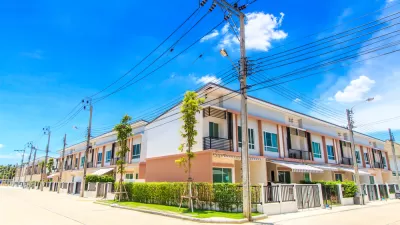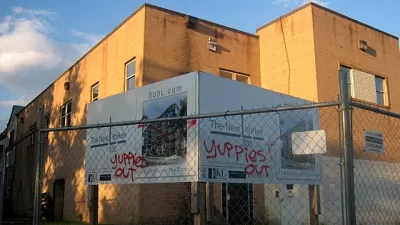This morning, one of my listservs was aflutter with discussion of a new article by Joel Kotkin, attacking an alleged "war against the suburbs." According to Kotkin, this "war" consisted of Jerry Brown’s efforts to "compel residents to move to city centers." After reading Kotkin’s article, I couldn’t really figure out exactly what Brown was trying to do- and since I don’t live in California, it really isn’t that important to me. However, it is important to realize that "smart growth" need not be the enemy of suburbs. Here’s why:
This morning, one of my listservs was aflutter with discussion of a new article by Joel Kotkin, attacking an alleged "war against the suburbs." According to Kotkin, this "war" consisted of Jerry Brown's efforts to "compel residents to move to city centers." After reading Kotkin's article, I couldn't really figure out exactly what Brown was trying to do- and since I don't live in California, it really isn't that important to me.
However, it is important to realize that "smart growth" need not be the enemy of suburbs. Here's why:
Suppose you are in a bucolic outer suburb, where one- and two-acre lots dominate the landscape. Under the sprawl status quo, more and more subdivisions are coming your way. That means your neighborhoods will become more like cities and older suburbs: more dense, more socially diverse. The residents of these subdivisions will crowd your roads, making your commute more difficult. By contrast, the most radical smart growth policies (such as Oregon's urban growth boundaries) limit developers' rights to build up those outer suburbs. Bad for the developers, but very good for you, the incumbent suburbanite.
What if you are in an older suburb? The sprawl status quo means that jobs and people will migrate to outer suburbs - but they'll still drive on your roads, so you still have traffic to worry about. Moreover, some of those people moving to outer suburbs may abandon your suburb. And if they are replaced by poorer households, your tax base and public schools may decline; eventually, you will be faced with the same problems as the troubled city nearby. So policies that limit outer-suburban development may protect your suburb from the problems of the Big Bad City.
In sum, arguments over sprawl and smart growth are not simply "city vs. suburb" battles. Suburbanites' interests are complex, and do not always square with the interests of the developers and road-builders.

Planetizen Federal Action Tracker
A weekly monitor of how Trump’s orders and actions are impacting planners and planning in America.

Restaurant Patios Were a Pandemic Win — Why Were They so Hard to Keep?
Social distancing requirements and changes in travel patterns prompted cities to pilot new uses for street and sidewalk space. Then it got complicated.

Map: Where Senate Republicans Want to Sell Your Public Lands
For public land advocates, the Senate Republicans’ proposal to sell millions of acres of public land in the West is “the biggest fight of their careers.”

Maui's Vacation Rental Debate Turns Ugly
Verbal attacks, misinformation campaigns and fistfights plague a high-stakes debate to convert thousands of vacation rentals into long-term housing.

San Francisco Suspends Traffic Calming Amidst Record Deaths
Citing “a challenging fiscal landscape,” the city will cease the program on the heels of 42 traffic deaths, including 24 pedestrians.

California Homeless Arrests, Citations Spike After Ruling
An investigation reveals that anti-homeless actions increased up to 500% after Grants Pass v. Johnson — even in cities claiming no policy change.
Urban Design for Planners 1: Software Tools
This six-course series explores essential urban design concepts using open source software and equips planners with the tools they need to participate fully in the urban design process.
Planning for Universal Design
Learn the tools for implementing Universal Design in planning regulations.
Heyer Gruel & Associates PA
JM Goldson LLC
Custer County Colorado
City of Camden Redevelopment Agency
City of Astoria
Transportation Research & Education Center (TREC) at Portland State University
Camden Redevelopment Agency
City of Claremont
Municipality of Princeton (NJ)






























